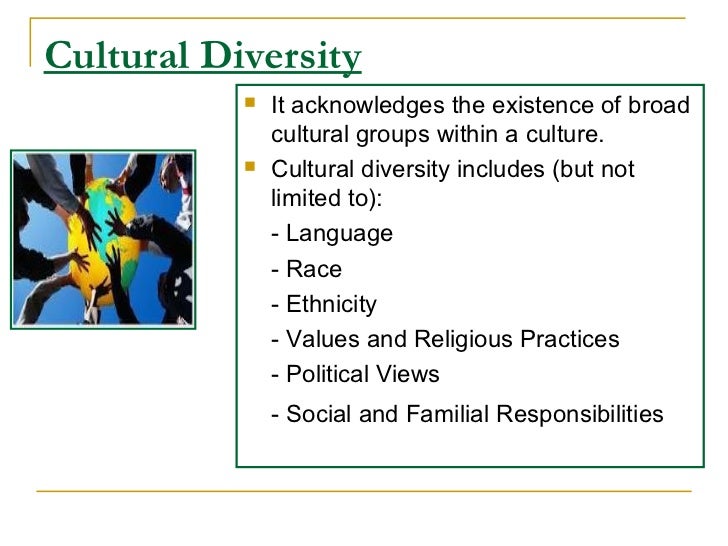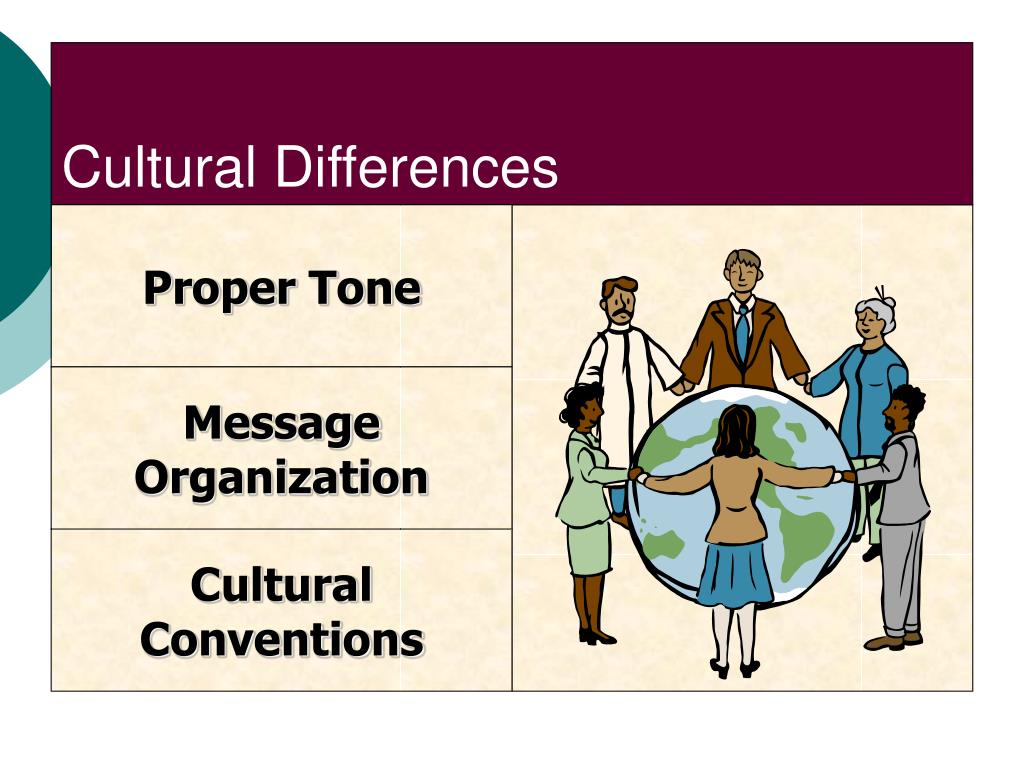The Cultural Differences Within Our Society

The inherited English language term for this concept is folkused alongside the latinate people since the late Middle English period. In Early Modern English and until the midth century, ethnic was used to mean heathen or pagan in the sense of disparate "nations" which did not yet participate in the Christian oikumeneas the Septuagint used ta ethne "the nations" to The Cultural Differences Within Our Society the Hebrew goyim "the nations, non-Hebrews, non-Jews". In Classical Greekthe term took on a meaning comparable to the concept now expressed by "ethnic group", mostly translated as " nationpeople"; only in Hellenistic Greek did the term tend to become further narrowed to refer to "foreign" or " barbarous " nations in particular whence the later meaning "heathen, pagan".

The sense of "different cultural groups", The Cultural Differences Within Our Society in American English "racial, cultural or national minority group" arises in the s to s, [13] serving as a replacement of the term race which had earlier taken this sense but was now becoming deprecated due to its association with ideological racism.
The abstract ethnicity had been used for "paganism" in the 18th century, but now came to express the meaning of an "ethnic character" first recorded The term ethnic group was first recorded in and entered the Oxford English Dictionary in The process that results in emergence of an ethnicity is called ethnogenesisa term in use in ethnological The Cultural Differences Within Our Society since about The term may also be used with the connotation of something exotic cf. Depending on which source of group identity is emphasized to define membership, the following types of often mutually overlapping groups can be identified: Ethno-nationalemphasizing a shared polity or sense of national identity — example: Austrians Ethno-racialemphasizing shared physical appearance based on phenotypes — example: African Americans Ethno-regionalemphasizing a distinct local sense of belonging stemming from relative geographic isolation — example: South Islanders of New Zealand Ethno-religiousemphasizing shared affiliation with a particular religion, denomination or sect — example: Jews In many cases, more than one aspect determines membership: for instance, Armenian ethnicity can be defined by citizenship of Armenianative use of the Armenian languageor membership of the Armenian Apostolic Church.
8. Barley Ice Cream
Definitions and conceptual history[ edit ] Ethnography begins in classical antiquity ; after early authors like Anaximander and Hecataeus of MiletusHerodotus laid the foundation of both historiography and ethnography of the ancient world c. The Greeks had developed a concept of The Cultural Differences Within Our Society own "ethnicity", which they grouped under the name of Hellenes. Herodotus 8. Many social scientists, [21] such as anthropologists Fredrik Barth and Eric Wolfdo not consider ethnic identity to be universal.
They regard ethnicity as a product of specific kinds of inter-group interactions, rather than an essential quality inherent to human groups.
Navigation menu
One is between " primordialism " and " instrumentalism ". Animal cruelty the The Cultural Differences Within Our Society view, the participant perceives ethnic ties collectively, as an externally given, even coercive, social bond. Constructivists view national and ethnic identities as the product of historical forces, often recent, even when the identities are presented as old. This is in the context of debates over multiculturalism in countries, such as the United States and Canada, which have large immigrant populations from many different cultures, and post-colonialism in the Caribbean and South Asia. Secondly, this belief in shared Gemeinschaft did not create the group; the group created the belief. Third, group formation resulted from the drive to monopolize power and status. This was contrary to the prevailing naturalist belief of the time, which held that socio-cultural and behavioral differences between peoples stemmed from inherited traits and tendencies derived from common descent, then called "race".
To Barth, ethnicity was perpetually negotiated and renegotiated by both external ascription and internal self-identification.

Barth's view is that ethnic groups are not discontinuous cultural isolates or logical a priority to which people naturally belong. He wanted to part with anthropological notions of cultures as bounded entities, and ethnicity as primordialist bonds, replacing it with a focus on the interface between groups. Barth writes: " He also described that in the first decades of usage, the term ethnicity had often been used in lieu of older terms such as "cultural" or "tribal" when referring to smaller groups with shared cultural systems and shared heritage, but that "ethnicity" had the added value of being able to describe the commonalities between systems of group identity in both tribal and modern societies. The Cultural Differences Within Our Society also suggested that claims concerning "ethnic" identity like earlier claims concerning "tribal" identity are often colonialist practices and effects of the relations between colonized peoples and nation-states. Sometimes these contradictions are destructive, but they can also be creative and positive.
Thus, anthropologist Joan Vincent observed that ethnic boundaries often have a mercurial character.
Newsletter
Kanchan Chandra rejects the expansive definitions of ethnic identity such as those that include common culture, common language, common history and common territorychoosing instead to define ethnic identity narrowly as a subset of identity categories determined by the belief of common descent. As Jonathan M. Hall observes, World War II was a turning point in ethnic studies. The consequences of Nazi racism discouraged essentialist interpretations of ethnic groups and race.

Ethnic groups came to be defined as social rather than biological entities. Their coherence was attributed to shared see more, descent, kinship, a commonplace of origin, language, religion, customs, and national character. So, ethnic groups are conceived as mutable rather than stable, constructed in discursive practices rather than written in the genes.
For them, the idea of ethnicity is closely linked to the idea of nations and is rooted in the pre-Weber understanding of humanity as being divided into primordially existing groups rooted by kinship and biological heritage. This theory sees ethnic groups as natural, not just as historical. It also The Cultural Differences Within Our Society problems dealing with the consequences of intermarriage, migration and colonization for the composition of modern-day multi-ethnic societies.]
![[BKEYWORD-0-3] The Cultural Differences Within Our Society](https://classconnection.s3.amazonaws.com/109464/flashcards/803869/jpg/culture_shock.jpg)
The Cultural Differences Within Our Society - god knows!
Discuss the textbook six steps on how frames work in negotiations. There are many steps to repairing a relationship. Mention the textbook steps one can take when seeking to improve a relationship. All rights reserved. Printed in the United States of America. No part of this publication may be reproduced or distributed in any form or by any means, or stored in a database or retrieval system, without the prior written consent of McGraw- Hill Education, including, but not limited to, in any network or other electronic storage or transmission, or broadcast for distance learning. Some ancillaries, including electronic and print components, may not be available to customers outside the United States. This book is printed on acid-free paper. Donnelley All credits appearing on page or at the end of the book are considered to be an extension of the copyright page. The Cultural Differences Within Our Society.
Write A Rhetorical Analysis Of The Scientific Method By
2022-05-26
Faezragore
It is a pity, that now I can not express - it is very occupied. But I will be released - I will necessarily write that I think on this question.
Dreams Of My Mother Rhetorical Analysis
2022-05-26
Kezragore
Yes, really. And I have faced it. We can communicate on this theme. Here or in PM.
Food Pyramids
2022-05-28
Vogar
It to you a science.
Acupuncture By James Reston
2022-05-28
Gall
Rather amusing message
A Modern Day Nation State Turkey
2022-05-28
Gagar
You are not right. Let's discuss.

Category
Best Posts
- Contract Negotiation
- was andrew jackson a good president essay
- emperor henry iv and pope gregory vii
- Sport Psychology Essay
- Honor Codes In Tobias Wolffs Old School
- proofread essays
- adult vs embryonic stem cells
- paraphrase my essay
- compare and contrast 5 2
- Early Cases Of Judicial Activism The Following
- the case of the floundering expatriate
- purchase a research paper
- buy term papers online
- multitasking doesnt work use this 100 year old method to get stuff done
- Essay About Tupac Shakur






 1109
1109